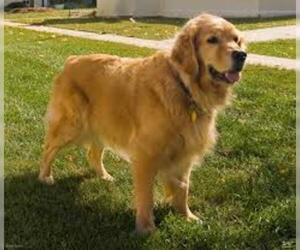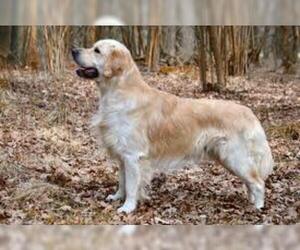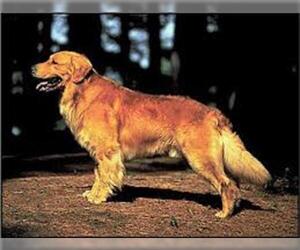
All about Golden Retriever dog breed
A.K.A. :Golden, Goldie, GR, Golden Pup, Golden Companion, British Retriever, Scottish Retriever, Yellow Retriever, Golden Fluff, Golden Scout, Golden Gun Dog, Field Golden, Golden Hunter, Sunshine Dog, Golden Friend
Size
Grooming requirements
Exercise requirements
Good with other dogs
Watchdog ability
Energetic
Training requirements
Playful
Affectionate
Good with other pets
Good with children
Good with strangers
Winter
Summer
Healthiness
Protective
Life Span
| Pure Breeds | Member |
| Breeds A - Z | G |
| Breeds by Group | Gun Dog Sporting |
| Breeds by Trait | Good With Kids High Stamina Dog Breeds Smartest Dog Breeds |
| Overview: | The Golden Retriever, a beloved breed originating from the Scottish Highlands in the mid-19th century, was developed for retrieving game from land and water. Physically, they are medium-sized dogs known for their striking golden-colored coats, ranging from cream to dark gold, which are dense and water-repellent. Their gentle eyes and friendly smiles are as characteristic as their feathered tails and strong, well-proportioned bodies. Temperamentally, Golden Retrievers are celebrated for their amiable, intelligent, and devoted nature, making them exceptionally patient and tolerant companions. This makes them superb family dogs, typically great with children and other pets, though their need for space and exercise means they are generally less suited for apartment living. While generally robust, they are prone to certain health concerns such as hip and elbow dysplasia, certain cancers, and eye conditions, making regular veterinary check-ups crucial for their long-term well-being. |
F.A.Q.
All You Need to Know About the Golden Retriever Breed
The Golden Retriever, originating from Scotland, is renowned for its friendly and intelligent disposition, making it an excellent family dog. Physically, they boast a beautiful golden coat, a strong build, and a distinctive gentle expression. Their temperament is generally calm and eager to please, making them highly trainable and good with children and other pets. While adaptable, their size and exercise needs mean they are better suited for homes with yards than small apartments, though daily walks and mental stimulation are crucial. Grooming involves regular brushing to maintain their lush coat and minimize shedding. Potential owners should be aware of common health issues such as hip and elbow dysplasia, certain cancers, and eye conditions, emphasizing the importance of choosing a reputable breeder. Overall, the Golden Retriever is a loyal, loving, and active companion perfect for families seeking an engaging and affectionate pet.Golden Retriever Weight: Healthy adult Golden Retrievers typically weigh between 55-75 pounds. Males are generally larger, averaging 65-75 pounds, while females usually range from 55-65 pounds. This average size represents a healthy weight for Golden Retriever and a well-proportioned frame.
Wondering about the Golden Retriever height and how tall these wonderful dogs get? You've come to the right place!
The average size of an adult Golden Retriever, measured at the shoulder (or withers), typically falls within a range of 21.5 to 24 inches.- For male Golden Retrievers, the typical height range is 23 to 24 inches.
- For female Golden Retrievers, they are generally a bit smaller, ranging from 21.5 to 22.5 inches.
The Golden Retriever breed primarily comes in shades of gold, ranging from a light, almost cream color to a rich, deep golden or even a darker, reddish golden. These variations of golden are the only AKC recognized Golden Retriever colors. While you might encounter descriptions like "white Golden Retriever" or "red Golden Retriever," these are typically just lighter or darker interpretations within the accepted golden spectrum.There are no officially recognized Golden Retriever colors such as brindle, fawn, blue, lilac, merle, or chocolate. These rare coat types or exotic Golden Retriever variations are not found in purebred Golden Retrievers and would indicate mixed breeding. Be wary of breeders marketing "blue Golden Retrievers," "chocolate Golden Retrievers," or "merle Golden Retrievers" as purebreds, as these are misrepresentations and not genuine Golden Retriever colors. Focus on the beautiful and diverse range of golden hues for true Golden Retriever colors.
The Golden Retriever personality is renowned for its delightful and amiable nature, making it one of the most beloved family pets. This breed exhibits an exceptionally friendly and outgoing temperament of Golden Retriever, characterized by unwavering loyalty and a strong desire to please its human companions. They are highly sociable dogs, thriving on interaction and forming deep bonds with their families. Their adaptable nature means they can adjust to various living situations, though daily exercise is crucial. While not ideally suited for small apartment living due to their size and energy, they can adapt if provided with ample outdoor activity. Golden Retrievers are exceptionally good with children, displaying patience and a gentle demeanor. They also typically coexist harmoniously with other pets, making them an excellent choice for multi-pet households. Their intelligence and eagerness to learn contribute to their trainability, further enhancing their wonderful character.
The Golden Retriever temperament is renowned for being exceptionally friendly and good-natured, making them excellent family companions. They are highly sociable dogs, typically greeting everyone, including strangers, with a wagging tail. Their loyal and devoted nature ensures a strong bond with their human family.While Golden Retrievers are adaptable, their energy levels and need for exercise mean they thrive best with a yard; apartment living can be challenging without dedicated daily walks and playtime. They are famously patient and gentle, making them wonderful with children and generally very tolerant of other pets.Known for their eagerness to please and trainability, they can sometimes exhibit a mild stubbornness, especially during adolescence, but this is usually easily overcome with positive reinforcement. They are generally not sensitive dogs but do require consistent, kind handling. Their sweet disposition and intelligence make the Golden Retriever an ideal companion dog.
Golden Retriever Care: Your Daily GuideGolden Retriever care involves consistent daily maintenance for a happy, healthy companion. Despite their generally robust nature, understanding their specific needs is crucial.Grooming Needs: Golden Retrievers are not low-energy dog breed in terms of shedding! Expect moderate to heavy shedding year-round, requiring weekly brushing to manage their dense double coat and prevent matting. Occasional professional grooming may be beneficial. Bathe as needed, typically every 4-8 weeks, using a dog-specific shampoo.Exercise Limitations: While often seen as an active breed, Golden Retrievers are prone to overheating, especially in warm climates. They are NOT a low-energy dog breed, but exercise should be moderate and consistent, around 30-60 minutes daily, including walks, playtime, and mental stimulation. Avoid strenuous exercise during the hottest parts of the day.Dietary Considerations: Feed a high-quality, age-appropriate dog food formulated for medium to large breeds. Monitor caloric intake carefully to prevent obesity, a common issue for the breed. Consult your vet for specific dietary recommendations and to discuss any food sensitivities.Wrinkle and Ear Cleaning: Pay special attention to their adorable wrinkles and long, floppy ears. Clean ear canals weekly with a veterinarian-approved solution to prevent infections. Check and clean any facial folds or wrinkles daily to prevent skin irritation and infection.Climate Sensitivity (Brachycephalic Anatomy): How to care for a Golden Retriever in various climates is vital. Despite not being a true brachycephalic breed, Golden Retrievers are sensitive to heat due to their thick coats. Avoid prolonged outdoor activity in hot, humid weather, and always provide fresh water and shade. They generally tolerate colder climates better, but still require shelter from extreme cold.Common Health Concerns: Be aware of common health issues. Skin issues like allergies and hot spots are prevalent, often requiring veterinary attention. Dental care is paramount; daily brushing or dental chews are recommended to prevent periodontal disease. Weight management is crucial for preventing joint problems and other health complications. Regular veterinary check-ups are essential for early detection and prevention of these and other conditions. Follow these health tips for Golden Retriever to ensure a long and fulfilling life together.
The Golden Retriever activity level is generally moderate to high, making them an excellent fit for active families. These intelligent and playful dogs require substantial daily exercise to stay healthy and happy. Typically, Golden Retrievers need at least 60-90 minutes of vigorous activity per day, which can include brisk walks, jogging, swimming, or active fetch sessions. They thrive on mental stimulation alongside physical exertion, enjoying activities like obedience training, agility, and puzzle toys. Golden Retrievers are known for their love of playtime, often engaging enthusiastically with toys and other dogs. While they possess a good amount of energy, they also balance short bursts of intense activity with longer periods of rest and relaxation indoors. It's important to note that Golden Retrievers, despite their activity level, are not considered brachycephalic; this term applies to breeds with short, pushed-in snouts like Bulldogs or Pugs. Therefore, they do not face the exercise limitations associated with brachycephalic anatomy. Understanding how active are Golden Retrievers is crucial for potential owners. They are not suitable for low-energy households that cannot commit to their significant exercise needs, as a lack of activity can lead to boredom, destructive behaviors, and weight gain. Conversely, their affectionate nature and willingness to please make them wonderful companions for those who enjoy an active lifestyle.
Breed Breakdown: What Experts Say About the Golden Retriever
I would rate the "Size" trait of the Golden Retriever at a 7.Golden Retrievers are undeniably a medium to large-sized breed. While not reaching the colossal proportions of a Great Dane or Irish Wolfhound, they are significantly larger than most companion breeds. Their average height typically ranges from 21.5 to 24 inches at the shoulder, and their weight can be anywhere from 55 to 75 pounds, with some individuals exceeding these averages. They possess a sturdy, muscular, and well-proportioned body structure, built for activity and retrieving.When compared to other common companion dogs, a Golden Retriever is substantially bigger than a Shih Tzu, Cavalier King Charles Spaniel, or even a Beagle. They stand taller and carry more weight than breeds like the Border Collie or Australian Shepherd. While they might be dwarfed by a Mastiff, they are far from being considered "small" or even "medium-small."This size makes them less than ideal for consistent apartment living, especially if they don't have regular, substantial outdoor exercise. While a well-exercised and trained Golden Retriever *can* adapt to an apartment, it's not their optimal environment. They require space to stretch out, move around, and express their natural energy. Travel can also be more challenging due to their size; they often require larger crates for car travel and may not fit comfortably in airplane cabins as carry-on pets. Households with significant space constraints would likely find a Golden Retriever to be a handful, as their robust size needs room to maneuver without constantly bumping into things or feeling cramped. They are best suited for homes with a yard or easy access to open spaces for exercise and play.
I would rate the grooming requirements of the Golden Retriever a 7 out of 10.While not as demanding as some long-haired, non-shedding breeds that require professional sculpting, Golden Retrievers are far from wash-and-wear. Their dense, water-repellent double coat sheds moderately year-round and heavily twice a year, necessitating frequent brushing (daily or every other day) to remove loose fur, prevent mats and tangles, and distribute natural oils. Failure to do so can quickly lead to painful matting, especially behind the ears, on the legs, and in their "feathers." They require regular bathing to keep their coat healthy and clean, particularly given their love for water and outdoor activities. Their floppy ears are prone to infections if not cleaned regularly, and their nails grow quickly, requiring consistent trimming. They can also be susceptible to allergies and skin issues, which can increase the need for specialized shampoos or more frequent bathing. Compared to many other companion dogs with shorter, simpler coats, Golden Retrievers require a significant time commitment to maintain their health and appearance, making them relatively high-maintenance in the grooming department.
I would rate the Golden Retriever's "Exercise Requirements" at a 7.Golden Retrievers are a highly energetic and active breed that thrives on regular, structured exercise. They are certainly not a breed that can be content with minimal activity; they require daily, sustained movement to stay physically healthy and mentally stimulated. Their historical role as retrieving dogs means they have a natural inclination for activity, and they possess considerable stamina. While not brachycephalic, meaning they don't have the severe respiratory limitations of breeds like Pugs or Bulldogs, they are still prone to overheating in very hot weather, which should always be considered. They excel in a variety of exercises, from brisk walks and vigorous playtime (especially fetch, which they adore) to more demanding activities like swimming, hiking, and even dog sports such as agility and obedience. Without adequate exercise, Golden Retrievers can become bored, destructive, and even prone to weight gain. They truly benefit from a routine that includes at least one long, energetic session daily, in addition to shorter potty breaks and enrichment activities.
I would rate the Golden Retriever's "Watchdog Ability" as a 3 out of 10.While Golden Retrievers are often alert to their surroundings and will typically bark to signal the arrival of a new person or an unusual noise, their nature is overwhelmingly friendly and non-confrontational. Their barking is more of an "alert" rather than a "deterrent." They lack the territorial instincts and inherent suspicion of strangers that characterize true watchdog breeds. Upon an intruder's arrival, a Golden Retriever is far more likely to approach with a wagging tail, seeking attention, than to stand their ground or attempt to intimidate. They are excellent at providing a "this person is here!" early warning, but offer virtually no follow-through in terms of deterrence or protection. They are a wonderful, passive companion, but not capable of providing meaningful early warnings in a way that would make an intruder think twice about entering.
I would rate the "Good with Other Dogs" trait of the Golden Retriever a 9 out of 10.Golden Retrievers are renowned for their gentle and amiable disposition, which extends beautifully to their interactions with other dogs. Typically, they exhibit a natural curiosity and friendliness towards unfamiliar canines, often initiating playful bows or maintaining a respectful distance without signs of aggression or fear. Their adaptable nature generally allows them to coexist peacefully with dogs of various sizes and energy levels, often adjusting their play style to match a smaller or older dog. While early socialization is beneficial for any breed, Golden Retrievers usually thrive in canine company and readily integrate into multi-dog households, often acting as a calming influence. They are not prone to dominance or aggression, making them excellent companions for other pets. While careful introductions are always a good practice with any new animal, Golden Retrievers rarely require extensive training to coexist peacefully and more often than not, they genuinely enjoy and seek out the companionship of other dogs.
I'd rate the "Energetic" trait of the Golden Retriever a 7 out of 10.Golden Retrievers are undeniably active dogs, renowned for their enthusiasm and playful nature. They possess significant endurance and a strong desire to participate in various activities, from long walks and runs to retrieving games and swimming. Their history as gundogs bred for retrieving over varied terrain speaks to their inherent need for physical stimulation and their capacity for sustained effort. Compared to many other companion breeds, they are naturally active and require a good amount of daily exercise to prevent boredom and destructive behaviors. While not as perpetually "on-the-go" as some working breeds like Border Collies or Jack Russell Terriers, they are far from laid-back and will eagerly join in on outdoor adventures. Their brachycephalic anatomy, however, is not a factor for Golden Retrievers; they are a mesocephalic breed with a medium-length muzzle, meaning they do not typically suffer from the respiratory issues or exercise intolerance associated with brachycephalic breeds like Pugs or Bulldogs. This allows them to maintain a high level of stamina and enjoy extended periods of activity without the breathing difficulties that would otherwise limit their exercise.
I would rate the "Training Requirements" of the Golden Retriever at a 3 out of 10.Golden Retrievers are renowned for their intelligence, eagerness to please, and generally biddable nature, making them one of the easiest breeds to train. Their attention span is typically good, and they respond exceptionally well to positive reinforcement, often thriving on praise, treats, and toys. Stubbornness is rarely a defining trait; instead, they are usually highly motivated to work with their owners. Consistency is always beneficial in training any dog, but Golden Retrievers are forgiving of minor inconsistencies due to their inherent good nature. They are highly responsive to commands, often picking them up quickly. This makes them an excellent choice for beginner-friendly owners, as their trainable disposition makes the process rewarding and less frustrating. While structured routines are helpful for any dog, Golden Retrievers adapt well and don't typically require experienced handling to become well-behaved companions. Their natural desire to learn and cooperate means that most owners will find training them a relatively straightforward and enjoyable experience.
I would rate the Golden Retriever's "Playful" trait a 9 out of 10.Golden Retrievers are renowned for their almost perpetual puppy-like demeanor, even well into adulthood. They possess a naturally spirited and enthusiastic nature, consistently demonstrating a high activity level and a profound love for games and interaction. Their attention-seeking behavior is usually rooted in a desire to engage in shared activities, whether it's a vigorous game of fetch, a swim, or a simple romp in the yard. Their response to toys and playtime is incredibly enthusiastic; they typically greet new toys with excitement and are always eager to participate in any form of play their human initiates. Their overall enthusiasm in daily life is palpable, often expressed through wagging tails, bright eyes, and a general eagerness to be involved in whatever is happening around them. Compared to many other companion dogs, Goldens are far from laid-back and consistently exude an energetic and fun-loving spirit.
I'd rate the "Affectionate" trait of the Golden Retriever at a 9.Golden Retrievers are renowned for their exceptionally loving and people-oriented nature. They have an almost insatiable desire for human companionship and thrive on being part of the family. Physical closeness is a hallmark of the breed; they are enthusiastic cuddlers, often attempting to become lap dogs regardless of their size, and will happily lean against or rest a paw on their owner. Their loyalty is unwavering, forming strong bonds with their family members. Goldens are also quite sensitive to owner emotions, often picking up on moods and offering comfort. It's very common to find them "shadowing" their owners from room to room, just wanting to be near. While no dog is completely dependent, Golden Retrievers are definitely on the side of thriving on affection and interaction, rather than being independent compared to many other companion breeds. They genuinely seek and enjoy consistent love and attention.
I would rate the "Good with Other Pets" trait of the Golden Retriever a 9 out of 10.Golden Retrievers are renowned for their gentle and amiable disposition, which extends remarkably well to other animals. Their typical behavior around other dogs and cats is characterized by curiosity and a desire to interact, often in a playful manner. They generally have a low prey drive compared to many other breeds, making them less likely to see smaller pets as something to chase or harm. While individual differences exist, resource guarding tendencies are not a hallmark of the breed; they are usually quite shareable and tolerant. Goldens are naturally sociable and often thrive in multi-pet households, adapting readily to new animal companions. While early socialization is beneficial for any dog to develop good manners, Golden Retrievers are often predisposed to peaceful coexistence and require less intensive training or constant supervision than breeds with higher prey drives or stronger guarding instincts to live harmoniously with other animals. Their inherent kindness and desire to please generally make them excellent companions for a variety of other pets.
Rating: 10/10The Golden Retriever is an exceptional breed for families with children, earning a perfect 10. Their temperament is the cornerstone of this rating: they are renowned for their inherent gentleness, boundless patience, and unwavering affection. Goldens possess a natural love for play, often initiating games that delight children of all ages, from toddlers to teenagers. They exhibit a remarkable tolerance for the usual noise and boisterous activity that comes with kids, and are generally very forgiving of clumsy handling, making them ideal companions for younger children learning how to interact with a dog. This breed is naturally gentle and affectionate, often forming deep bonds with their human "pack," especially the younger members. While basic training and socialization are always beneficial for any dog, a Golden Retriever's fundamental nature is already perfectly aligned with thriving in a family setting without extensive corrective measures. They are intuitive and eager to please, making them relatively easy to train, further enhancing their compatibility with children.
I would rate the "Good with Strangers" trait of the Golden Retriever at a 9.Golden Retrievers are renowned for their exceptionally friendly and outgoing nature, especially towards unfamiliar adults. They are naturally sociable and possess a strong desire to please, which translates into a welcoming demeanor for most. Typically, a Golden will greet strangers with a wagging tail, an eager sniff, and often an attempt at a gentle lean or a playful nudge for attention. While they might bark initially as a notification of someone's presence, this usually quickly transitions into a friendly greeting rather than sustained guarding or aggression. Their high adaptability means they generally thrive in public settings or environments with many guests, taking new people in stride. While early socialization is beneficial for any dog to build confidence, Golden Retrievers are inherently predisposed to be comfortable and affable with strangers, making extensive training specifically for this trait less of a necessity and more of a reinforcement of their natural inclinations. They rarely exhibit shyness or unfriendliness, embodying the definition of a "people dog."
I would rate the Golden Retriever's winter tolerance at a 7.Golden Retrievers possess a thick, water-repellent double coat that provides a good degree of insulation against cold temperatures. Their medium-to-large size contributes to better heat retention compared to smaller breeds. They also typically have a moderate amount of body fat, which aids in warmth. Crucially, they are not a brachycephalic breed, meaning their respiratory system is generally efficient and less prone to issues in cold, dry air compared to flat-faced dogs. This combination allows them to safely enjoy outdoor activities in moderately cold climates for extended periods.However, a rating of 7, rather than a perfect 10, acknowledges their limitations. While resilient, they are not arctic dogs like Huskies or Malamutes. Their dense coat, while protective, can also become saturated in wet snow, reducing its insulating properties and increasing the risk of hypothermia if they remain inactive or exposed for too long. They are also prone to certain health conditions that can be exacerbated by cold, such as arthritis, and their paw pads can be sensitive to ice, salt, and extreme cold.Compared to many other companion dogs, Golden Retrievers generally require less special care in winter. However, they are not "set it and forget it" in extreme cold. Owners should still be mindful of prolonged exposure in very low temperatures, especially when wet, and provide warm, dry shelter. Paw protection (balms or booties) is advisable in icy or salted conditions. For older or arthritic Goldens, additional warmth and shorter, more frequent outdoor trips are recommended. While they thrive on winter walks and playing in the snow, common sense and observation of the dog's comfort level are always key.
I would rate the Golden Retriever's "Summer" tolerance a 3.Golden Retrievers, despite their active nature, are quite sensitive to heat due to their thick double coat which is designed for insulation in cooler weather, not for dissipating heat in summer. While not brachycephalic, their dense fur significantly hinders their ability to regulate body temperature effectively. They are at a moderate to high risk of heatstroke, especially during exercise or extended periods outdoors in warm weather. Their recommended outdoor activity levels should be severely reduced during summer months, especially during the hottest parts of the day. They absolutely require special care in summer, more so than many other companion dogs. They need constant access to shade, fresh cool water, and often benefit from indoor climate control, even on moderately warm days, to prevent overheating. They are not a breed that thrives in hot climates without significant human intervention and precautions.
I would rate the "Healthiness" trait of the Golden Retriever breed as a 6 out of 10.Golden Retrievers are a beloved breed, but they do have a notable predisposition to several serious health conditions, which prevents them from receiving a higher rating. Hip and elbow dysplasia are very common joint problems, and they are also highly susceptible to certain cancers, particularly hemangiosarcoma and lymphoma, which significantly impact their life expectancy and often require extensive treatment. Skin allergies and eye conditions like progressive retinal atrophy are also frequently observed.While responsible breeding practices and preventive care (such as regular vet check-ups, appropriate diet, and exercise) can mitigate some of these risks and improve the quality of life, the genetic predispositions remain a significant factor. Compared to some more robust companion dog breeds, Golden Retrievers can be considered somewhat high-maintenance due to the need for vigilant monitoring and potential for expensive medical interventions. They are not as fragile as some brachycephalic breeds, but their cancer risk and joint issues are substantial concerns that pull their overall health score down from a truly robust rating.
I would rate the "Protective" trait of the Golden Retriever at a 4.Golden Retrievers are renowned for their gentle and friendly disposition, making them exceptional family companions. They are certainly alert to their surroundings and will often bark to signal the arrival of a stranger, which makes them decent "doorbell" watchdogs in that they will notify you of someone's presence. However, their territorial instincts are generally low, and their reaction to strangers is more often characterized by curiosity and a desire for affection than by aggression or suspicion. Their profound loyalty to their owners translates to a strong desire to be near them, but this doesn't typically manifest as a fierce protective stance against perceived threats. While they might place themselves between an owner and a perceived danger out of concern, their natural inclination is not to act as a guard dog or to aggressively defend their territory or family. They are far more suited as companion dogs who might offer a vocal warning, rather than a breed capable of offering meaningful physical protection in a household setting. Their natural inclination is to greet and befriend, not to deter or confront.
I would rate the Golden Retriever's "Life Span" trait a 6 out of 10.Golden Retrievers are generally considered to have an average lifespan compared to other companion dog breeds, not exceptionally long-lived but also not notably short-lived. Their average life expectancy typically ranges from 10 to 12 years. While some individuals may live longer, they are unfortunately prone to several significant health issues that can shorten their lives. Cancer, particularly various forms of lymphoma, hemangiosarcoma, and osteosarcoma, is a major concern and a leading cause of death in the breed, often striking at a relatively young age. Other common genetic predispositions include hip and elbow dysplasia, heart conditions like subvalvular aortic stenosis (SAS), and certain eye conditions, which, while not always fatal, can impact quality of life and potentially contribute to earlier euthanasia in severe cases. Responsible breeding practices, including health clearances for parents, and diligent owner care, such as proper nutrition, regular exercise, and prompt veterinary attention, can certainly help maximize a Golden Retriever's lifespan and improve their quality of life, but they cannot entirely eliminate the genetic predispositions to serious illnesses that affect the breed.
Golden Retriever Puppies for saleSee all puppies for sale
Golden Retriever Dogs for adoptionSee all dogs for adoption
Golden Retriever BreedersSee all breeders
Similar Dog Breeds for Golden Retriever
Breed Mixes of Golden Retriever
Quick Breed Selector 0 - not important, 1 - smallest, 10 - largest
Variants & Mistakes :Golden Retreiver, Goldn Retriever, Golen Retriever, Golden Retriver, Goldin Retriever, Golden Reitreiver, Golden Retrieer, Golden Retrievar, Golden Retrieever, Goldan Retriever, Gulden Retriever, Golden Rettriever, Golden Retriiver, Golden Retrieveir, Golden Retrirver, Golden Retrievor, Golden Retrivr, Golden Retrieverr, Golder Retriever, Golden Retrever, Goldem Retriever, Golen Retreiver, Golden Retrieiver, Goldon Retriever, Golden Retrriver, Golden Retrievel, Golden Retrivier, Golden Retrive, Golden Retreiv





